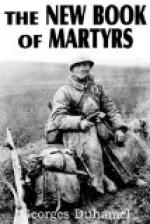At last he is laid on the table which the wounded men call the “billiard-table.”
Then, things become very trying. I feel at once that whatever I do, Gregoire will suffer. I uncover the wound in his thigh, and he screams. I wash the wound carefully, and he screams. I probe the wound, from which I remove small particles of bone, very gently, and he utters unimaginable yells. I see his tongue trembling in his open mouth. His hands tremble in the hands that hold them, I have an impression that every fibre of his body trembles, that the raw flesh of the wound trembles and retracts. In spite of my determination, this misery affects me, and I wonder whether I too shall begin to tremble sympathetically. I say:
“Try to be patient, my poor Gregoire.”
He replies in a voice hoarse with pain and terror: “I can’t help it.”
I add, just to say something: “Courage, a little courage.”
He does not even answer, and I feel that to exhort him to show courage, is to recommend an impossible thing, as if I were to advise him to have black eyes instead of his pale blue ones.
The dressing is completed in an atmosphere of general discomfort. Nothing could persuade me that Gregoire does not cordially detest me at this moment. While they are carrying him away, I ask myself bitterly why Gregoire is so deficient in grace, why he cannot suffer decently?
The Sergeant says, as he sponges the table: “He’s working against one all the time.” Well, the Sergeant is wrong. Gregoire is not deliberately hostile. Sometimes I divine, when he knits his brows, that he is making an effort to resist suffering, to meet it with a stouter and more cheerful heart. But he does not know how to set about it.
If you were asked to lift a railway-engine, you would perhaps make an effort; but you would do so without confidence and without success. So you must not say hard things of Gregoire.
Gregoire is unable to bear suffering, just as one is unable to talk an unknown language. And, then, it is easier to learn Chinese than to learn the art of suffering.
When I say that he is unable to bear suffering, I really mean that he has to suffer a great deal more than others. ... I know the human body, and I cannot be deceived as to certain signs.
Gregoire begins very badly. He reminds one of those children who have such a terror of dogs that they are bound to be bitten. Gregoire trembles at once. The dogs of pain throw themselves upon this defenceless man and pull him down.
A great load of misery is heavy for a man to bear alone, but it is supportable when he is helped. Unfortunately Gregoire has no friends. He does nothing to obtain them, it almost seems as if he did not want any.
He is not coarse, noisy and foul-mouthed, like the rascal Groult who amuses the whole ward. He is only dull and reserved.
He does not often say “Thank you” when he is offered something, and many touchy people take offence at this.




